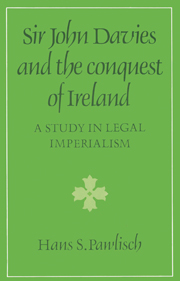Book contents
- Frontmatter
- Contents
- Preface
- Abbreviations
- PART I INTRODUCTION
- 1 Law as an instrument of colonization
- 2 Sir John Davies: a biographical sketch
- 3 Ireland and the origins of stare decisis
- PART II JUDICIAL ENCOUNTERS: THE NATIVE COMMUNITY
- PART III JUDICIAL ENCOUNTERS: THE COLONIAL COMMUNITY
- PART IV CONCLUSION
- Notes
- Select bibliography
- Index
- Cambridge Studies in the History and Theory of Politics
3 - Ireland and the origins of stare decisis
from PART I - INTRODUCTION
Published online by Cambridge University Press: 13 October 2009
- Frontmatter
- Contents
- Preface
- Abbreviations
- PART I INTRODUCTION
- 1 Law as an instrument of colonization
- 2 Sir John Davies: a biographical sketch
- 3 Ireland and the origins of stare decisis
- PART II JUDICIAL ENCOUNTERS: THE NATIVE COMMUNITY
- PART III JUDICIAL ENCOUNTERS: THE COLONIAL COMMUNITY
- PART IV CONCLUSION
- Notes
- Select bibliography
- Index
- Cambridge Studies in the History and Theory of Politics
Summary
In 1603, John Davies travelled to Dublin to assume his duties as Solicitor-General for Ireland. His appointment followed the defeat of Tyrone's rebel forces and the final subjugation of the long-recalcitrant kingdom. As one of the principal advocates of English policy during the next sixteen years Davies worked to consolidate and perpetuate this military conquest by a series of judicial decisions which transformed the legal and administrative structure of the island. In 1615 the Attorney-General presented a number of these judgements in his publication of the Irish Law Reports. In format these Reports reflect the early modern reporting system at its most mature level. Like the reports of Plowden, Dyer and Coke, Davies' work departs from the yearbook tradition, giving full introduction to pleadings that focus on demurrers or special verdicts. Apart from several cases decided by resolution of the Irish justices, Davies' care in framing full case headings also allows the reader to identify easily the precise tribunal adjudicating each case. The Reports which were derived mainly from Davies' own work in the Dublin courts understandably emphasize the pleadings of the Attorney-General or Solicitor-General. But either in his capacity as king's advocate, or in acting as private counsel before the Dublin courts, Davies was meticulous in divorcing his own opinions from those of other counsel and the court.
- Type
- Chapter
- Information
- Sir John Davies and the Conquest of IrelandA Study in Legal Imperialism, pp. 34 - 52Publisher: Cambridge University PressPrint publication year: 1985
- 1
- Cited by



